|
|
|
Sort Order |
|
|
|
Items / Page
|
|
|
|
|
|
|
| Srl | Item |
| 1 |
ID:
169263
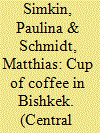

|
|
|
|
|
| Summary/Abstract |
This study deals with the contemporary dynamics of urban life in Bishkek. Since the dissolution of the Soviet Union, Central Asian societies have experienced widespread political, economic and socio-cultural transformations. In this context, Western or globalized cultural modes and trends influence Kyrgyzstan's social and cultural life. One of these trends is the increasingly popular coffee culture, with its attendant high-grade coffee brands and fancy cafés changing established consumption patterns. This article focuses primarily on cafés as new places of consumption and communication, but it also examines the intentions and strategies of the café pioneers. We reflect on the emergence of coffee and cafés in Bishkek and show how they have integrated in urban life as ‘third places’. Coffee is breaking away from its commonly soluble form and moving toward an expensive lifestyle product, while the new cafés offer a place for communication that has not existed before.
|
|
|
|
|
|
|
|
|
|
|
|
|
|
|
|
| 2 |
ID:
176488
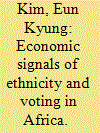

|
|
|
|
|
| Summary/Abstract |
The existing literature has demonstrated that both ethnic and economic factors affect a vote decision in African democracies. I show that there is a meaningful interaction between the two cleavages in their influence on voting. In particular, I argue for political salience of agricultural subsectors that shape the electoral consequences of economic performance in the context where agricultural policy affects the livelihood of the majority population. Relying on the analyses of the 2007 and 2013 elections in Kenya, I illustrate how likely an individual, who is attached to a politically coherent ethnic group, votes for a candidate, the majority of whose ethnic members engage in the same industry as the voter himself regardless of the candidate's ethnicity. The results show that the sector factor reinforces the positive and negative effects of ethnic communities on incumbent support, and also explains voting by ethnic minorities whose motives for voting are not ethnic.
|
|
|
|
|
|
|
|
|
|
|
|
|
|
|
|
| 3 |
ID:
122454
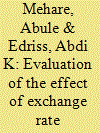

|
|
|
|
|
| Publication |
2013.
|
| Summary/Abstract |
Research was conducted to find out the effects of exchange rate variability, terms of trade, competitiveness and gross domestic product on the dominant export crop of Ethiopia, coffee. This study employs annual time series data (1992-2010) and uses the autoregressive distributive lag (ARDL) model augmented by the Wald test. The results reveal that exchange rate variability has a negative effect on the export of coffee in the short run, but is insignificant in the long run. This implies that, over time, exchange rate changes in the country have been favouring the export performance of coffee. Regardless of exchange rate variability, the competitiveness of the country, explained by real effective exchange rates, improved, but the price of coffee did not increase relative to the price of imports, which has resulted in deteriorating terms of trade. To improve the worsening terms of trade and benefit from policy changes, export diversification and value addition are possible solutions the country should focus on.
|
|
|
|
|
|
|
|
|
|
|
|
|
|
|
|
| 4 |
ID:
163242
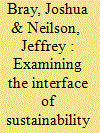

|
|
|
|
|
| Summary/Abstract |
Voluntary sustainability standards are used as both a means of securing coffee supply by large coffee firms and a development intervention to address rural poverty and environmental management in the Global South. Using a case‐study approach, we have examined the interface between a value‐chain sustainability programme and the livelihood trajectories of smallholder producers in upland Sumatra. Our research found the programme has had minimal impacts for coffee producers to date. The level of commitment required of producers appears incompatible with the particular way that coffee is currently embedded within local landscapes, livelihoods and poverty alleviation pathways. Various sustainability standards articulate a narrative of rural development underpinned by an assumption that agricultural modernisation is the preferred pathway out of poverty for rural households. As a result, there is some risk that sustainability programmes may be inadvertently attempting to encourage household investment in a particular kind of agriculture, which is intended to assist sustainability of supply, but is poorly aligned with prevailing processes of poverty alleviation. These observations are based on a detailed study of agrarian change among the Semendo people of South Sumatra province, where processes of rural development are far more complex than assumptions presented by mainstream sustainability standards.
|
|
|
|
|
|
|
|
|
|
|
|
|
|
|
|
| 5 |
ID:
088487


|
|
|
|
|
| Publication |
2009.
|
| Summary/Abstract |
This research note describes the second stage of 'Fair Tracing', a research project funded by the Engineering and Physical Sciences Research Council of the United Kingdom. The project aims to support ethical trade by implementing digital tracing technologies in value chains to provide consumers and producers with enhanced information about specific products; in this case, Chilean wine and Indian coffee. The genesis and first stage of the project - as it relates to the India case study - was documented in an earlier research note published in Contemporary South Asia one year ago. This note goes on to describe the second stage of this case study, which begins by mapping the life of the coffee bean in its current global commodity chain, and ends with proposing a traceable value chain for small growers of Indian coffee. It is argued that the use of tracking technologies will help increase the value chain 'rents' that accrue to farmers in developing countries by allowing them to charge more for differentiated products increasingly demanded by informed consumers, both in the West and in home markets.
|
|
|
|
|
|
|
|
|
|
|
|
|
|
|
|
| 6 |
ID:
139445


|
|
|
|
|
| Summary/Abstract |
Despite the increasing acknowledgment of scholars and practitioners that many large-scale agricultural land acquisitions in developing countries fail or never materialize, empirical evidence about how and why they fail to date is still scarce. Too often, land deals are portrayed as straightforward investments and their success is taken for granted. Looking at the coffee sector in Laos, the authors of this article explore dimensions of the land grab debate that have not yet been sufficiently examined. Coffee concessionaires in southern Laos often fail to use all of the land granted them and fail to produce high yields on the land they do use. Thus, the authors challenge the often-assumed superiority and effectiveness of large-scale versus small-scale production, specifically the argument that they modernize agricultural production and optimize land use. They argue that examining failed investments is as important as studying successful ones for understanding the implications of the land grabbing phenomenon for social, economic, and environmental outcomes. Knowledge about the scale of “failed land deals” provides important motivation for national governments to close the gap between intentions and actual outcomes. This article engages with the current debate on quality of investment and challenges the approach of employing land concessions as a vehicle for economic development in the Lao coffee sector and in other sectors and countries.
|
|
|
|
|
|
|
|
|
|
|
|
|
|
|
|
| 7 |
ID:
179936


|
|
|
|
|
| Summary/Abstract |
Since the publication of my article “Network monarchy and crises of legitimacy in Thailand” (Pacific Review, 2005), network monarchy has become an influential concept in the analysis of Thailand’s politics. Though widely adopted, the argument has also spawned rival or complementary coinings, ranging from “autonomous political networks” (Harris) to “working towards the monarchy” (Uenaldi), and the “deep state” (Merieau); as well as the “parallel state” and the “monarchized military” (Chambers and Napisa). This article revisits the argument, elaborates on the meanings of the original term and makes a case for network monarchy’s continuing salience in the Tenth Reign.
|
|
|
|
|
|
|
|
|
|
|
|
|
|
|
|
| 8 |
ID:
132404
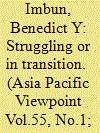

|
|
|
|
|
| Publication |
2014.
|
| Summary/Abstract |
The challenge of ensuring economic opportunities are made available to a country's population is a key function of any government. It is particularly acute in many developing countries where the subsistence economy is dominant and where limited formal employment opportunities exist. For such countries, reliance on cash cropping provides a central plank in earning foreign exchange. More importantly, it provides an important source of cash incomes for the largely subsistence-based population. Papua New Guinea (PNG) is one such example with a significant rural population dependent on cash crops for their economic livelihood. This paper discusses the country's coffee industry in the context of its producers, most importantly the contribution made by small household growers, and the issues and challenges they face. The paper traces the emergence of coffee as a cash crop in the PNG highlands and discusses, among other things, recent developments in extension and points out possibilities for government intervention to ensure the continued viability of the highlands coffee industry. Conceptually, the discussion acknowledges the significance of relational economics and its underpinnings, particularly reflections of duality of labour, perceptions of coffee as cash crop and markets in the context of Indigenous growers.
|
|
|
|
|
|
|
|
|
|
|
|
|
|
|
|
| 9 |
ID:
145928


|
|
|
|
|
| Summary/Abstract |
This article focuses on the development of the tobacco industry in Iran during the seventeenth and eighteenth centuries. It uses this discussion as an entry point to inquire about the early modern Iranian economy. Using a wide range of primary and secondary sources, it makes several historiographical interventions. In explaining what the development of a completely new agrarian industry means in Iranian society, the paper suggests that innovation and intensification may not have been completely absent in agriculture and that in contrast to the way some of the available literature tends to argue, the Iranian economy may not have experienced continuous decline in all sectors throughout the seventeenth and eighteenth centuries. In addition, this article contends that the tobacco industry helped bring about the rise of merchants and landowners in Iranian society, and with that the further development of mass consumption and ever-increasing cycles of production and accumulation that expanded the commercialization of agriculture, domestic and international trade networks, and Iran's agrarian economy.
|
|
|
|
|
|
|
|
|
|
|
|
|
|
|
|
| 10 |
ID:
090686


|
|
|
|
|
|
|
|